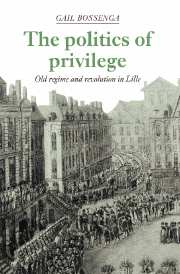Book contents
- Frontmatter
- Contents
- List of figure and tables
- Preface
- List of abbreviations
- 1 Monarchy, privilege and revolution: the problem and setting
- 2 State finance and local privileges
- 3 Corps, bureaucracy and citizenship: the case of the Bureaux des Finances
- 4 The excluded nobility and political representation
- 5 A nation of equals: the demands of the Third Estate
- 6 Uses of a regulated economy: the state against itself
- 7 Corporate privilege and the bourgeoisie
- 8 The abolition of the guilds
- 9 The corporate heritage and the well-ordered state
- 10 Conclusion
- Notes
- Bibliography
- Index
5 - A nation of equals: the demands of the Third Estate
Published online by Cambridge University Press: 01 October 2009
- Frontmatter
- Contents
- List of figure and tables
- Preface
- List of abbreviations
- 1 Monarchy, privilege and revolution: the problem and setting
- 2 State finance and local privileges
- 3 Corps, bureaucracy and citizenship: the case of the Bureaux des Finances
- 4 The excluded nobility and political representation
- 5 A nation of equals: the demands of the Third Estate
- 6 Uses of a regulated economy: the state against itself
- 7 Corporate privilege and the bourgeoisie
- 8 The abolition of the guilds
- 9 The corporate heritage and the well-ordered state
- 10 Conclusion
- Notes
- Bibliography
- Index
Summary
In May 1787 merchants and manufacturers from Lille and the neighboring textile villages of Roubaix, Lannoy, and Armentières asked Lille's Chamber of Commerce to convoke a general assembly to petition for political reform. In a meeting later that month, several of Lille's négociants called Calonne's proposal for provincial assemblies and his convocations of the Notables “the hope of France.” Walloon Flanders was called a pays d'états, the merchants observed cynically, but it was really a pays d'abonnements. The taxpayers were not consulted or represented; they had no knowledge of the fate of public monies or control over the administrations' accounts. Interest payments on the bonds were in arrears, and taxes, which fell on the poorest classes, were higher than ever. Citing the letters of Jean sans Peur of 1414, Laverdy's edict of 1766, and the nobility's call for new provincial estates, one merchant, Placide Pankoucke, asked the merchants and manufacturers to support a campaign for new local estates. Approximately forty of them signed his declaration.
During the next year and a half, the royal government seemed unsure how to respond to the political pressure mounting in the province. The situation at Versailles changed almost monthly as royal ministers resorted to one palliative after another in the hopes of shoring up the monarchy a little bit longer. After the crown's impending bankruptcy led to Calonne's fall in August 1788, the Swiss banker, Necker, was recalled to tide the monarchy over until the Estates General met in May 1789. Provincial politics began to become nationalized, as local groups debated who should have the right to sit in the Estates General and how the votes should be tallied.
- Type
- Chapter
- Information
- The Politics of PrivilegeOld Regime and Revolution in Lille, pp. 89 - 112Publisher: Cambridge University PressPrint publication year: 1991



